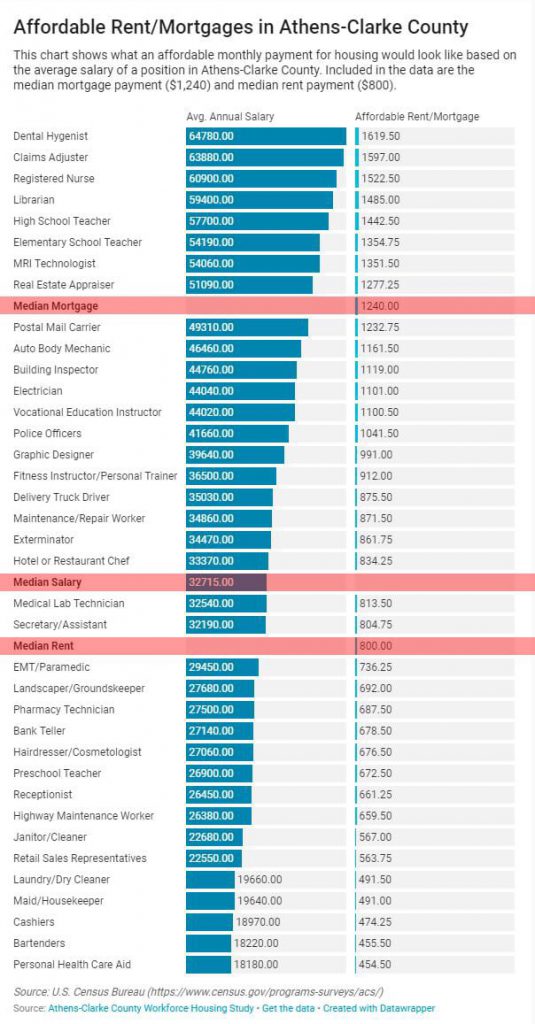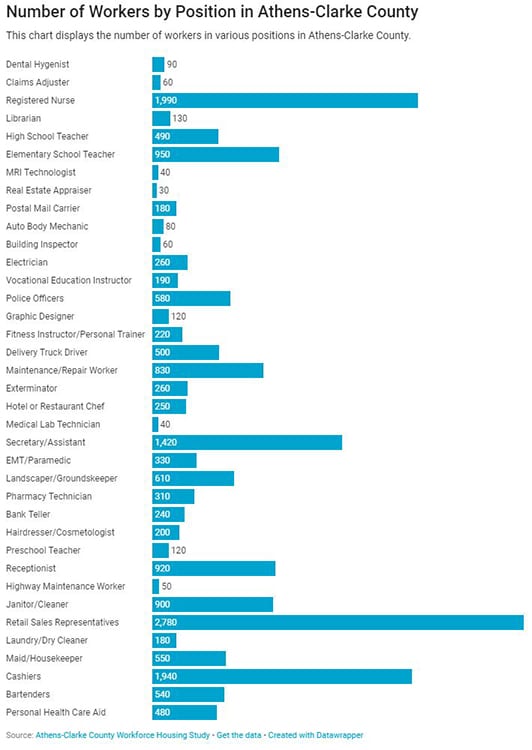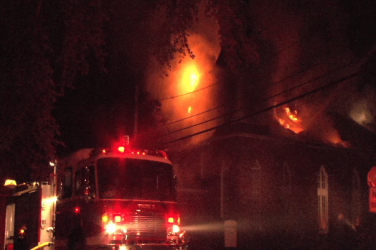More than half of the members of the Athens workforce are unable to afford median rent, according to the Athens-Clarke County Workforce Housing Study. This study was created to support and maintain workforce housing in Athens as well as find and resolve issues with current housing stock.
According to the report, workforce households are those with earned income from 60 to 120 percent of the area’s median income, which may still be insufficient in obtaining decent housing in reasonable proximity of local job centers.
The increase in students at the University of Georgia has put those defined as living in workforce households at a disadvantage in finding a place to live.
From 2005 to 2015, 19 apartment buildings were constructed, amounting to 2,225 new units in Athens. Of these, 67 percent of the units were dedicated to student housing with only three of the complexes targeting working families. When looking at the last decade overall, only 11 percent of the units in the Athens housing market were provided to members of the local workforce.
Umit Yilmaz, a professor at the University of Georgia for the College of Environment and Design, explained why the decisions of developers can be problematic.
“We plan new developments, new neighborhoods or apartments, then if the regulations require that a certain percentage be affordable, [developers] need to design equipment to get it approved,” Yilmaz said.
While the study said developers are stingy in providing workforce housing, Yilmaz said quality often takes a hit as well.
“Usually planners and developers try to comply with [regulations], but since developers are interested in profits, if they don’t make money, they don’t do anything,” Yilmaz said. “So then they try to comply with affordable housing requirements, but then they offer low quality affordable housing.”
The lack of affordable housing for the Athens workforce has become so prevalent that, according to the study, the only demographic hit harder by this issue than the workforce is the city’s senior population.
A Workforce Aware of Its Reality
Daniel L. Mapp, a long-time resident of Athens and member of the city’s workforce, is employed by both the local branch of FedEx Ground and Haven Business Services. However, in addition to Mapp’s official employment, he dedicates time to being a poet and activist, working for the advancement of the Athens working class.
Having lived in the area for generations, Mapp has been affected by the degradation of affordable workforce housing, a phenomenon he said has been steadily worsening over the past few years.
“I have dealt with this on a personal level due to my family being moved around at least four times due to the poor economy here in Athens outside of the University of Georgia,” Mapp said. “It’s really hard for you to be a worker, let alone an entrepreneur, here in the city due to the expansion of the University of Georgia itself. A lot of low-income neighborhoods are no longer low-income neighborhoods.”
According to Mapp, rising housing prices isn’t the only cause for the lack of affordable housing for the Athens workforce. Instead, he points to a combination of low workforce wages and rising prices for causing the discrepancy.
“We’re not creating a stable middle class, and it’s getting to the point where you’re either part of the really wealthy or the working poor,” Mapp said. “And that’s taking place here in the city of Athens itself. A lot of people are not conscious of it, but it’s taking place.”
Regardless of causes, Mapp said the result is a harrowing reality for the local workforce.
“Imagine the reality that the working class lives, imagine the perception that they perceive things through. They live in a state of mind,” Mapp said. “They know that the world around them is condemned and they know that it’s shrinking around them, yet they’ll live check to check to check. Though they have hope, that hope is slim.”
(Click to hear full audio interview.) “You have a small opportunity, a small window to be successful,” Mapp said. “If you don’t, you’re condemned.”
Local Government Acknowledges Issue, Still No Change
“First of all, when we talk about [solutions], we have to create hospitable living wages,” Mapp said, pointing to actions such as unionizing the local workforce to raise wages and increase workers rights. Continuing, he also noted that this might not be an easy task. “Local government has to get behind it, but we have to correct the whole entire system of the state of Georgia for that to happen.”
However, the Athens-Clarke County local government is cognizant of the issue. Marqueta Swain, a coordinator within the Housing and Community Development Department for ACC, said that local government is aware of the status of workforce housing and how this status hasn’t changed since the department commissioned the 2015 study.
“There is a limited affordable workforce housing inventory,” Swain said. “The affordable workforce housing situation is about the same in Athens-Clarke County since the study.”
Swain also said local government is working to address the issue.
“The Unified Government of Athens Clarke County Housing and Community Development Department works with affordable housing partners in the community to address affordable housing needs and identify possible solutions,” said Swain.
Melissa Link, the county commissioner for Athens-Clarke County’s third district, is also paying attention to the city’s current housing situation. She pointed to the lack of action following the study when noting that the scarcity of affordable housing can affect other areas of concern.
“Nothing has really been done to follow up on that study; the major findings being that we are not building enough new affordable, single-family housing in ACC and our moderate-income folks are leaving Athens and choosing to live in outer counties where they can afford to live.” Link said. “They’re driving into Athens, which is exacerbating our traffic issues.”
Trevon Johnson, Ben Tankersley and Emma Korstanje are journalism majors within the Grady College of Journalism and Mass Communication.











